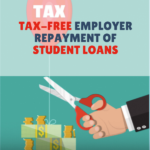
Prior to the recently-passed CARES Act, employer student loan assistance was treated as wages. Thus, employees had to pay income taxes and employers were required to pay payroll taxes on any student loan assistance paid to employees.
But, while it hasn’t gotten as much attention as the relief stimulus checks, the CARES Act has temporarily made employer student loan assistance payments tax-free through the end of 2020. And then, when Trump signed the Covid-19 relief at the end of December 2020, it extended this benefit through 2025.
That’s a big incentive for both the employer and employees to take advantage of these programs. In this article, we’ll look at the employer student loan assistance program before the CARES Act and how it has temporarily changed.
How Employer Student Loan Assistance Programs Usually Work
Student loan repayment assistance programs (LRAPs) allow companies to make monthly payments directly to an employee’s student loan lender. The loans can be either federal or private.
These programs have been around for a few years and have been slowly gaining traction. The upside for employers is that it is another tool to entice top talent.
A 2019 survey by the Society for Human Resource Management (SHRM) found that 8% of employers provided student loan repayment assistance in 2019, which was up from 4% in 2018 and 3% in 2015. See the list we've compiled of companies that offer student loan assistance.
The important thing to point is that employer student loan assistance is normally increases an employee's tax bill. Basically, it is additional wages and elevates the employee’s overall taxable income.
Interestingly, tuition reimbursement programs receive better tax treatment from the federal government. Currently, companies can give employees up to $5,250 of tax-free tuition reimbursement payments per year. Learn more about tuition reimbursement plans.
How the CARES Act Impacts Employer Student Loan Assistance Programs
With the new Coronavirus Aid, Relief, and Economic Security Act (CARES Act), a temporary tax-free provision is provided for employer student loan assistance programs.
Section 2206 of the CARES Act allows a portion of student loan payments to be excluded from income. Whether those payments are made directly to the employee or the lender, they will be tax-free. The income exclusion is up to $5,250 per year per employee.
This new provision benefits both the employee and employer. The employee gets to avoid paying income tax on the student loan payments, while the employer gets a payroll tax exclusion.
How Long Does This Tax Benefit Last?
For now, these tax changes are only set to remain in effect until December 31, 2025. So to take advantage of these incentives, people will need to start going back to work this summer. This tax incentive is basically rendered useless while you're unemployed (and over 30 million people currently are).
But it's important to point out that the CARES Act has also temporarily suspended payments and interest on federal student loans. The pause on payments will remain in effect until August 31, 2022 (for now).
Federal student loan borrowers can take advantage of the pause in payments until September when they'll hopefully be in a position to advantage of the tax-free employer student loan assistance from October - December.
Unfortunately, private student loan borrowers do not qualify for the CARES Act 6-month payment pause. So if you have private student loans, it would be in your best interest to begin participating in your company's LRAP program as soon as possible.
Can You Combine Tax-Free Employer Loan Assistance With Tuition Reimbursement?
Yes and no. The CARES Act provision modifies the existing Section 127, which permits an employer to pay up to $5,250 of an employee’s qualified educational expenses with the payment being tax-free to the employee.
This is now a combined limit. Thus, an employer could pay $3,000 towards an employee’s Master’s degree and another $4,000 of the same employee’s student loan payments each year through 2025. But the maximum amount that will be tax-free to the employee is $5,250.
Also, you cannot deduct the interest on student loans to the extent that it is paid on a tax-free basis through either of these programs. Learn more about the student loan interest deduction.
How Can You Qualify?
If you want to take advantage of this program, your employer needs a Section 127 program created. If you're self employed, you'd need to create a Section 127 program for your own business.
This isn't terribly hard, and there are companies that can help. However, it is an added expense and companies may not want to offer it or create the required program.
Final Thoughts
There's a lot to love about the CARES Act tax-free employer student loan assistance provision. First, it could encourage more employers to adopt these programs as part of their new-hire package.
However, that's yet to be seen, because it's still an added expense to employer's bottom line. And when almost 1-in-5 Americans is out of work, employers don't usually have to put together competitive compensation packages.
Second (and, perhaps, more importantly) this could be the first step towards Congress voting to pass the Employer Participation in Repayment Act, which calls for LRAP payments to become permanently tax-free.

Robert Farrington is America’s Millennial Money Expert® and America’s Student Loan Debt Expert™, and the founder of The College Investor, a personal finance site dedicated to helping millennials escape student loan debt to start investing and building wealth for the future. You can learn more about him on the About Page or on his personal site RobertFarrington.com.
He regularly writes about investing, student loan debt, and general personal finance topics geared toward anyone wanting to earn more, get out of debt, and start building wealth for the future.
He has been quoted in major publications, including the New York Times, Wall Street Journal, Washington Post, ABC, NBC, Today, and more. He is also a regular contributor to Forbes.
Editor: Clint Proctor Reviewed by: Chris Muller
